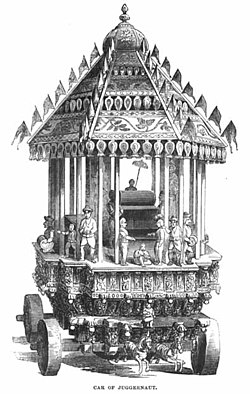From Wikipedia, the free encyclopedia

A juggernaut (American pronunciation ) is a term used to describe a force regarded as unstoppable, that will crush all in its path.
The word is derived from the Sanskrit Jagannātha[1] (meaning "Lord of the universe") which is one of the many names of Krishna from the ancient Vedic scriptures of India. One of the most famous of Indian temples is the Jagannath Temple in Puri, Orissa, which has the Ratha Yatra ("chariot procession"), an annual procession of chariots carrying the murtis (statues) of Jagannâth (Krishna), Subhadra and Baladeva (Krishna's elder brother). During the British colonial era, Christian missionaries promulgated a falsehood that Hindu devotees of Krishna were lunatic fanatics who threw themselves under the wheels of these chariots in order to attain salvation.[citation needed] Such a description can also be found in the popular 14th-century work The Travels of Sir John Mandeville. This is also described in Melmoth the Wanderer. In rare instances in the festival's past, people had been crushed accidentally as the massive 45-foot-tall, multi-ton chariot slipped out of control, with others suffering injury in the resulting stampedes. This sight led the Britons of the time to contrive the word "juggernaut" to refer to examples of unstoppable, crushing forces.[citation needed]
In modern times, the government officers and temple priests managing the festival take elaborate precautions to protect people from injury during these processions.[citation needed]
Since 1968 the Ratha Yatra festival has become a common sight in most major cities of the world through the Hare Krishna movement. Its leader A.C. Bhaktivedanta Swami Prabhupada successfully transplanted the festival, which now happens on an annual basis in places such as London, Paris, Toronto and New York.[citation needed]










No comments:
Post a Comment